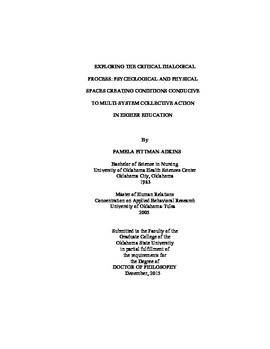| dc.contributor.advisor | Kearney, Kerri | |
| dc.contributor.advisor | Blum, Denni | |
| dc.contributor.author | Pittman-Adkins, Pamela | |
| dc.date.accessioned | 2016-09-29T18:46:20Z | |
| dc.date.available | 2016-09-29T18:46:20Z | |
| dc.date.issued | 2015-12 | |
| dc.identifier.uri | https://hdl.handle.net/11244/45376 | |
| dc.description.abstract | Purpose: The purpose of this study is to explore physical and psychological elements conducive to engaging educators from K-12 and higher education in meaningful exchanges that lead to collective action. | |
| dc.description.abstract | Research Design: Through a qualitative case study of two higher education sites focused on advancing academically-based service learning partnerships between K-12 and higher education framed in a constructivist epistemological worldview to explore conditions conducive to collective action. Participants were selected using a purposeful sample from a population of leaders in the Netter Center for Community Partnerships, University of Pennsylvania, or the Higher Education Forum of Oklahoma. | |
| dc.description.abstract | Method: Through interviews, observations, media imagery elicitation, and document and artifacts analyses, the perceptions and lived experiences of leaders involved in efforts to develop K-12 and higher education academic partnerships were explored. | |
| dc.description.abstract | Theoretical Lenses: Multiple theories provided lenses for analyses including critical dialogical discourse, transformational leadership, servant leadership, adaptive leadership, authentic leadership, social discourse, generative relationality discourse, trust theories, and intergroup contact theory in equity. | |
| dc.description.abstract | Research Question: One primary research question guided this study with two subquestions: What are the conditions that encourage critical dialogue or other behaviors that serve as a springboard for collective action? Subquestions: How do educators describe environments they perceive as conducive for critical dialogue and other behaviors that lead to collective action? What are the physical, organizational, psychological, and/or cultural factors that are perceived as facilitating conditions that precede collective action? | |
| dc.description.abstract | Findings: The findings from this study were organized around four meta-themes including (1) creating equity (2) responsive leadership (3) developing relationships and a sense of community, and (4) other influencing factors. This study extends theory, research, and practice on the roles of administrators and practitioners in higher education institutions seeking to address societal needs through advancing academically-based service learning partnerships with K-12 educators. | |
| dc.format | application/pdf | |
| dc.language | en_US | |
| dc.rights | Copyright is held by the author who has granted the Oklahoma State University Library the non-exclusive right to share this material in its institutional repository. Contact Digital Library Services at lib-dls@okstate.edu or 405-744-9161 for the permission policy on the use, reproduction or distribution of this material. | |
| dc.title | Exploring the critical dialogical process: Psychological and physical spaces creating conditions conducive to multi-system collective action in higher education | |
| dc.contributor.committeeMember | Foubert, John | |
| dc.contributor.committeeMember | Davis, Robert | |
| osu.filename | PittmanAdkinsPhD_okstate_0664D_14308.pdf | |
| osu.accesstype | Open Access | |
| dc.type.genre | Dissertation | |
| dc.type.material | Text | |
| thesis.degree.discipline | Educational Leadership and Policy Studies | |
| thesis.degree.grantor | Oklahoma State University | |
